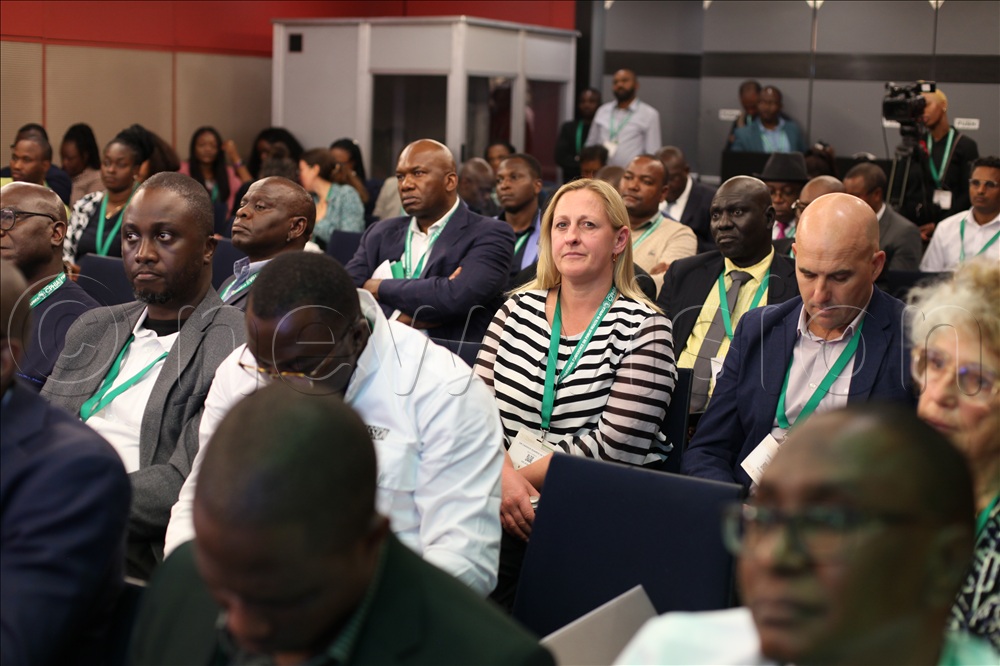At CPHIA 2025, Magoola rallies Africa to build its own pharmaceutical power
Dr Magoola said Africa’s transformation must come from within through home-grown innovation, manufacturing, and regulatory independence.
Ugandan scientist and founder of Dei Biopharmaceuticals, Dr Mathias Magoola during his presentation at CPHIA 2025. (Photos by John Musenze)
________________
DURBAN — Ugandan scientist and founder of Dei Biopharmaceuticals, Dr Mathias Magoola, has issued a rallying call for Africa to build its own pharmaceutical capacity and end dependence on imported life-saving drugs.
Speaking passionately at the Continental Stocktaking of Africa's Health Research, Development, and Manufacturing Ecosystem session during CPHIA 2025, Dr Magoola said Africa’s transformation must come from within through home-grown innovation, manufacturing, and regulatory independence.
“We want Africa to be able to manufacture all her essential drugs, including vaccines. We are bringing a solution for you in Africa. COVID-19 was a wake-up call that showed us we lacked capacity, yet the world left us begging even when we had the money,” he declared.
According to Dr Magoola, Dei Biopharmaceuticals has established facilities capable of producing over a billion doses of vaccines annually, ranging from oncology and hormonal drugs to antibiotics and mRNA-based therapies.
He said Uganda has made scientific breakthroughs that have attracted the attention of the U.S. Food and Drug Administration (FDA), including an FDA-endorsed development plan for antibody biosimilars and diabetes drugs.
“We have been able to secure the first-ever FDA acceptance for our own antibody biosimilars to be tested for efficacy. This will reduce the cost of biological drugs significantly, not just for Africa, but for the entire world,” he said.
Dr Magoola revealed that his company’s patented biotechnology platforms can cut the cost of expensive cancer and diabetes treatments by over 95%, making drugs affordable for millions of Africans who currently cannot access them.

“More than 90% of patients in Africa cannot afford these biological drugs. Our research is designed to change that reality,” he added.
He also called for the African Medicines Agency (AMA) to be fully empowered to approve drugs made on the continent.
“I’m requesting Africa CDC to ensure that AMA is empowered to give approvals for all drugs that are produced on the continent. Without it, our science will always be judged abroad,” he urged.
Dr Magoola called for partnerships and support from Africa CDC, reiterating that such innovations are a drive to stop African dependency.
He also promoted Ugandan-made drugs, noting that they are fully approved by all relevant drug bodies, with the goal of ensuring that 80% of countries worldwide can afford them.
Dr Raji Tajudeen, deputy director-general of the Africa Centres for Disease Control and Prevention (Africa CDC), reinforced the call for coordinated continental action.
He said Africa’s health sovereignty depends on its ability to invest in and sustain research and manufacturing capacity.
“It took millions of deaths during the COVID-19 pandemic for us to realise that we did not have the required capacity for research, development, and clinical trials on the continent,” Dr Raji remarked.
“A continent of 1.5 billion people should not be manufacturing only 1 per cent of its vaccines.”
He noted that African leaders have already issued a directive to shift vaccine production from 1 per cent to 60 per cent by 2040, a goal that requires collaboration, partnerships, and political will.
“We cannot guarantee our health security through goodwill; we have to seize the bull by the horns,” he emphasised.
“Our heads of state have given us the political backing — now the onus is on us to deliver.”
Dr Raji commended existing partnerships with the World Health Organisation (WHO), Team Europe, SEPI, and other partners for supporting Africa’s research and innovation agenda.
“We cannot do it alone, and we do not pretend to. That is why we continue to emphasise action-oriented partnerships. The time has come for Africa to own its health space,” he said.
“When the history of the manufacturing agenda is written in 2040, we must be able to say — yes, we were part of it,” Dr Raji added.
Hosted by Africa CDC in partnership with the Government of South Africa and AfricaBio’s BIO Africa Convention, the gathering aims to inspire a new era of African-led health solutions. Throughout the four-day conference, sessions will explore strategies to strengthen Africa’s health resilience.
During the opening session on October 22, Dr Nhlanhla Msomi, president of AfricaBio, the co-organiser, underscored the urgency of building innovation capacity.
“We know that our healthcare industry on the continent at large is using borrowed technologies, borrowed ideas, and borrowed science. Unless we move away and decouple from that, we’re not likely to win this battle.”